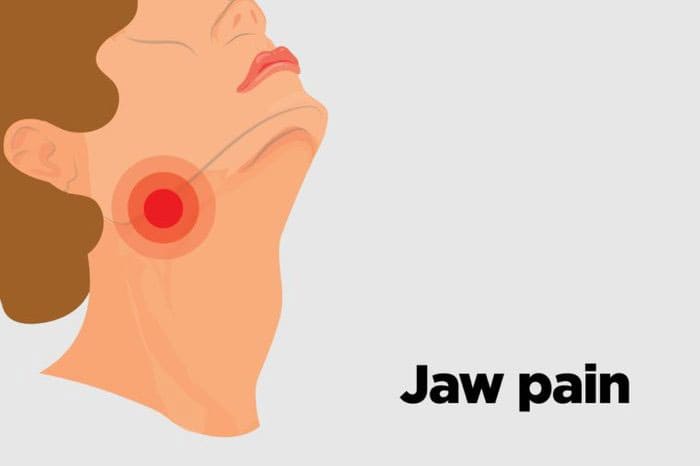Jaw Pain
05
July
2021

What is jaw pain?
Jaw pain is known as severe pain and physical discomfort in the jaws. It could also lead to earache, muscle tenderness, and headache, impeding the patient’s ability to eat or speak. It is a condition with a cause difficult to be determined since sometimes there is not only one problem but a combination of factors leading to it.
Jaw pain can be developed due to sinuses, infections, ear problems, dental issues, and many other problems. This means that the pain can be caused by the jaw itself or radiated by other areas of the face, which will be the case of referred pain.
Most of the time it can be resulting from temporomandibular joint disorders (TMJD) which are a heterogeneous group of musculoskeletal and neuromuscular conditions. Any disorder associated with the temporomandibular joints, the joints connecting the skull to the mandible, can alter the normal function of the muscles.
Jaw pain might not need immediate medical help, however, if the underlying cause provoking the pain is left untreated it can lead to other health problems you might not know about. For this reason, it is essential to call your health care provider if the pain persisted for longer than 2 days. After the doctor’s diagnosis, they will give the patient the right treatment to lessen the pain.
What causes jaw pain?
There are a myriad of problems causing pain in the face or jaw, it can be an abnormality, an injury, an infection, and others. Here are the most common reasons leading to mild or severe jaw pain:
-
Temporomandibular joint and muscle disorders (TMD):
Pain and dysfunction in the jaw joint and muscles are mainly caused by a group of conditions known as the TMJ. This disorder is divided into 3 categories:
Myofascial pain, referring to ache, soreness, and tenderness in the muscles controlling the function of the jaw. Internal derangement of the joint includes a condyle wound, a displaced disc, or a dislocated shoulder.
Arthritis, which is the group of inflammatory joint disorders such as synovitis and rheumatoid arthritis that are able to alter the function of the temporomandibular joint.
Although they are divided into 3 categories, these conditions can occur in a person at the same time.
But what causes TMD? It is known that TMD is more common in women than in men, but there is no exact cause that indicates the reason. It is possible to have several causes behind the TMD, they might include: Jaw joint injury or damage, a displaced disc, or a trauma to the jaw
-
Stress:
Stress and anxiety can cause an involuntary movement to clench your jaw or grind your teeth while you are asleep, and you might not be aware of it. This emotional stress that provokes clenching is known as bruxism.
Not only does it lead to jaw pain, but it can also damage your teeth. Grinding is when the person moves the jaw from side to side, on the other hand, clenching is when the person clenches their muscles without moving the teeth. A severe case of bruxism can lead to arthritis.
-
Trauma:
Any trauma can result in jaw pain, including:
- Dental surgery: since the recovery may take time, jaw pain can be the result of the procedure.
- Broken jaw: you can break your jaw by falling on your face or getting hit.
- Dislocated jaw: if you open your mouth way too wide, you might dislocate it.
-
Excessive chewing:
You might feel tightness in your mandible if you chewed excessively.
-
Neuropathic pain:
When nerves are damaged, they send pain signals to your brain. For instance, postherpetic neuralgia, and cancer-related pain.
-
Osteoarthritis (OA):
Although it is not very likely to happen, Osteoarthritis (OA) might occur on the temporomandibular joints’ level. It can deteriorate the normal functioning of the jaw. The pain is not only limited to the jaw, it can also extend to other areas of the face.
-
Tetanus:
This is a bacterial infection that can be deadly at times. When you’re suffering from this infection, you might feel trouble swallowing, stiffness, and painful muscle contractions in the jaw and neck.
- Salivary gland disorders
- Lack of sleep
- Mental health conditions

What are some exercises and treatments that can relieve jaw pain?
Since the jaw is made of muscles and bones, some exercises might help you to relieve the pain:
Manual jaw-opening exercise: in order to warm up, you do several mouth openings and closing movements. Then, put your fingers on the top of your front four bottom teeth. Pull down until you feel a little discomfort and that is when you hold for 30 seconds, then slowly release your jaw.
Jaw joint stretch: press the tip of your tongue behind your top front teeth then slowly open your mouth widely, then close it. Stop if you feel any discomfort or pain.
Smile stretch: stress in the facial muscles is eliminated thanks to this exercise. Smile as wide as you can without feeling any sort of pain. Inhale through your mouth, then exhale and let go of the smile at the same time.
Massage the affected joint: using your middle finger and your index, rub the sore areas in a circular motion 5 to 10 times, then open your mouth and repeat the exercise. To release the tension, try massaging the sides of your neck.
Concerning the treatment, it all depends on the diagnosis. But for immediate relief, you can:
Apply moist heat or ice packs: you can either place ice cubes on your face for 10 mins or you can run some warm water on a cloth and then place it on your jaw. Make sure if you put something on your face, whether it was hot or cold, to wrap it in cloth because it can burn your face.
Over-the-counter pain relievers: you can take medication like ibuprofen or acetaminophen to reduce the pain, but it is better if you ask your medical health provider beforehand.
Antibiotics: in case of infection
Now, let us talk about the medical treatments that can be given by the doctor:
Mouthguard: a mouth protector that covers the teeth and gums, preventing them from further injuries. If you wear one during your bedtime, you will stop clenching your teeth and grinding them.
Muscle relaxers: muscle relaxers can be prescribed to lessen the soreness and tenderness; however, some people might not find them effective.
Botox injections: when the botulinum toxin is injected into the jaw muscles, it may relieve the pain and help you stop clenching. But this solution only lasts for a few months, so you probably need to re-inject them later on.
Jaw surgery: even though it is rare, a doctor might ask you to do surgery to correct the Temporomandibular joint and muscle disorder. This surgery is usually limited to people who have a problem in their bone structure and those who suffer from severe pain.
How to diagnose the cause of jaw pain?
The doctor will first examine your jaw and teeth, they will try to identify the area that causes the most pain, then they will observe your jaw while it is opening and closing to see if there is any abnormality. In case they suspect a problem, your mind needs to:
Dental X-rays: to examine your jaw and your teeth.
CT scan: to get a detailed image of the joints.
MRI: it shows if there is any problem regarding the joint’s disc.
TMJ arthroscopy: this will allow the surgeon to determine the diagnosis by using a camera inserted through a thin tube.
How can you prevent jaw pain?
Several prevention techniques could be done in order to prevent jaw pain from occurring. Here are some of them:
Avoid chewy food.
Avoid caffeine, as it contributes to muscle tension.
Sleep well.
Seek regular dental care.
Try reducing your stress by meditation and exercising.
Massage regularly your jaw and your neck.
Follow a healthy diet.
Chew your food on both sides.
Apply hot or cold clothes.
Avoid activities that strain your jaw.
When to see a doctor?
When symptoms feel weird and new, the patient is advised to consult a healthcare provider, who will determine the actual cause of the pain. You should seek medical care if:
The pain persisted for more than 2 days.
Home remedies are not being effective.
The pain is interfering with your daily routine.
The jaw is making a popping sound when moving.
You encounter vision problems
You have a fever.
Pain is radiating to the neck.
There is swelling or any sign of infection.
If you or anyone you know is suffering from jaw pain, call us today on (469) 562 4188 to book an appointment with our expert doctors.